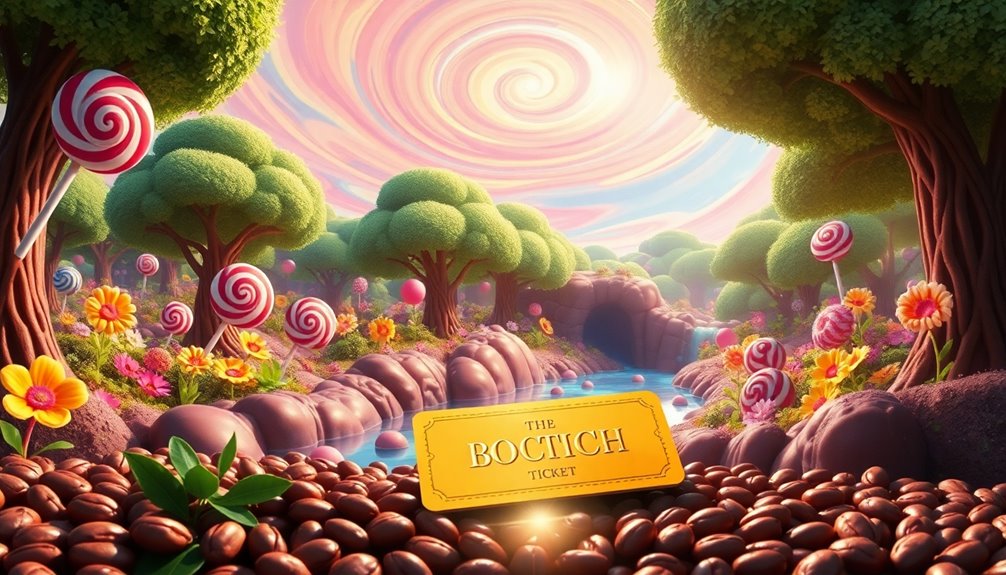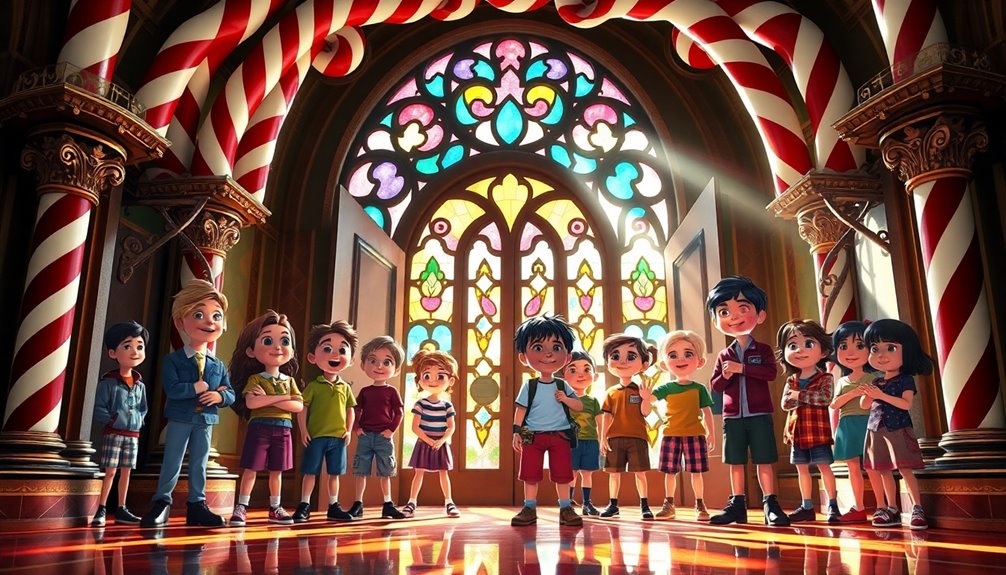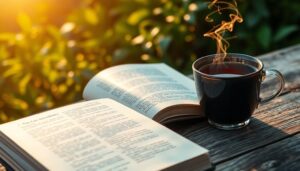If you're exploring the themes of 'Charlie and the Chocolate Factory,' you'll find a vibrant mix of morality, social class, and the impact of personal actions. Each character represents different traits, like greed or entitlement, showcasing how their choices lead to distinct consequences. Wealth and poverty play significant roles, illustrating how true happiness comes from integrity rather than riches. Parenting deeply influences behavior, shaping the characters' moral compasses. Charlie's journey highlights the importance of kindness and humility. The story is more than a whimsical adventure; it's a profound commentary on life's values and lessons. There's more to uncover about these themes.
Overview of the Story

"Charlie and the Chocolate Factory" tells the enchanting story of one boy's extraordinary adventure. You meet Charlie Bucket, a kind-hearted boy from a poor family who dreams of a better life. One day, he discovers a golden ticket hidden in a chocolate bar. This ticket grants him access to Willy Wonka's magical chocolate factory, a place filled with incredible inventions and whimsical sweets.
As the story unfolds, you travel with Charlie and four other children, each representing negative traits—greed, gluttony, selfishness, and entitlement. You witness the consequences of their actions, which serve as important moral lessons. While the other kids face their downfalls, Charlie's humility and kindness shine through. The fantastical setting of the factory showcases magical realms that captivate the imagination and enhance the adventure. The narrative serves as a timeless tale of hope and growth that echoes similar themes found in other classic literature.
Throughout the journey, the Oompa-Loompas, who work in the factory, add to the enchanting atmosphere, often singing songs that reinforce the moral lessons learned. In the end, Charlie's virtuous nature leads him to inherit Willy Wonka's factory, proving that goodness is rewarded. This timeless tale reminds you of the importance of character and virtue, making it relevant for both children and adults alike. Additionally, the story emphasizes the significance of acts of courage as a means to overcome adversity, much like Liesel's resilience in "The Book Thief."
Key Themes Explored
In "Charlie and the Chocolate Factory," you'll notice how characters' behaviors lead to significant consequences, reflecting their moral choices.
The ongoing battle of goodness versus badness plays out through the actions of each child, shaping their fates in the story. This dynamic is reminiscent of the power and corruption explored in novels like "The Daughters of Night," where characters navigate complex societal challenges.
As you explore these themes, it becomes clear that every decision has a ripple effect on their lives. This mirrors the exploration of personal growth found in Dickens' works, where characters evolve through their struggles and choices. Furthermore, the story illustrates how the consequences of one's actions can reflect the impact of social class on personal identity and values.
Behavioral Consequences in Characters
Behavioral consequences play a crucial role in "Charlie and the Chocolate Factory," illustrating how each child's character flaws lead to their undoing during the factory tour. For instance, Augustus Gloop's insatiable greed results in him getting stuck in a pipe, showcasing the perils of gluttony.
Similarly, Violet Beauregarde's fixation on gum turns her into a blueberry, emphasizing the dangers of obsession. Veruca Salt's spoiled and bratty behavior culminates in her punishment by the Oompa-Loompas, who send her down a garbage chute, highlighting the consequences of entitlement.
Mike Teavee's obsession with television leads to his shrinking during a teleportation experiment, serving as a warning against excessive media consumption.
In stark contrast, you see Charlie Bucket, whose kindness and humility protect him from negative consequences. His good behavior not only saves him but ultimately rewards him with Willy Wonka's factory.
This juxtaposition of characters reinforces the narrative's core message: poor behavior leads to dire outcomes, while virtuous actions can lead to great rewards. By observing these behavioral consequences, you gain insight into the importance of character and the impact it has on one's fate in the whimsical world of Willy Wonka.
Goodness Versus Badness Theme
Frequently, the theme of goodness versus badness stands out in "Charlie and the Chocolate Factory," illustrating the stark contrast between Charlie Bucket and the other children. Charlie embodies kindness and humility, while his peers showcase various vices that lead to their downfalls. This juxtaposition highlights important moral lessons through a cautionary tale.
Consider the negative traits of the other children:
- Augustus – Gluttony, leading to his excessive consumption.
- Veruca – Entitlement, resulting in her spoiled behavior.
- Violet – Obsession, causing her to chew gum incessantly.
- Mike – Addiction, fixating on television and video games.
Willy Wonka serves as a judge of character, rewarding Charlie for his selflessness and integrity. Unlike the other children, who succumb to their flaws, Charlie's goodness shines through, ultimately allowing him to inherit the factory and its wonders.
This stark dichotomy emphasizes that goodness ultimately prevails over badness. The story reinforces the notion that virtuous behavior is rewarded, reminding readers of the importance of good character in their own lives.
The Role of Character

In "Charlie and the Chocolate Factory," you see how the characters embody different moral traits, with Charlie's kindness standing out against the vices of the other children. Their contrasting behaviors lead to unforgettable consequences that highlight the importance of virtue over vice. The influence of parenting on their actions further underscores how character development shapes their destinies throughout the story. Additionally, this narrative echoes the themes of resilience and empowerment found in historical fiction, where characters often overcome societal challenges and inspire readers with their tenacity. The story also serves as a reminder of the transformative power of trauma recovery, illustrating how characters can emerge stronger from their experiences. This reflects the importance of self-reflection, as understanding one's character can lead to profound personal growth and positive change.
Character Contrasts and Lessons
The stark contrasts between Charlie Bucket and the other children in *Charlie and the Chocolate Factory* reveal essential lessons about character and morality. Charlie embodies kindness and humility, while each of the other children showcases distinct character flaws that lead to their downfalls:
- Augustus Gloop's gluttony teaches the dangers of excess.
- Veruca Salt's entitlement highlights the pitfalls of selfishness.
- Violet Beauregarde's obsession with competition emphasizes the importance of moderation.
- Mike Teavee's addiction to television illustrates the consequences of distraction.
These character flaws serve as a moral lesson about the repercussions of poor choices, often influenced by their parents' neglect or indulgence.
The narrative shows that true worth isn't determined by wealth or appearance; Charlie, with his modest background, stands in stark contrast to the extravagance of the other children.
Willy Wonka uses their experiences to test their character, ultimately rewarding Charlie for his good nature and perseverance.
Through these contrasts, the story emphasizes how parental influence shapes behaviors and the importance of developing a strong moral compass in the face of temptation.
Virtue Versus Vice Dynamics
Character flaws in *Charlie and the Chocolate Factory* vividly illustrate the clash between virtue and vice, shaping the narrative around the consequences of each. The five children who find Golden Tickets each embody distinct vices: Augustus Gloop's gluttony leads to his punishment of getting stuck in a pipe, while Veruca Salt's entitlement results in her being seized by squirrels.
Violet Beauregarde's greed manifests in her obsession with chewing gum, ultimately transforming her into a blueberry. Mike Teavee's fixation on television shrinks him down to size, illustrating the folly of his obsession.
In stark contrast, you see Charlie Bucket, who represents virtue through his kindness, generosity, and humility. While the other children face dire consequences for their vices, Charlie's virtuous behavior earns him the ultimate reward: inheriting Willy Wonka's factory.
The stark differences between these characters reinforce the moral lesson that virtue leads to reward and vice invites punishment. This dynamic not only serves as a cautionary tale but also emphasizes the importance of character in determining one's fate.
Ultimately, you're reminded that your actions define you, influencing the path your life will take.
Parental Influence on Behavior
Parenting styles play an essential role in shaping children's behaviors and values in *Charlie and the Chocolate Factory*. The four naughty children showcase how parental influence can lead to poor behavior, driven by indulgent or negligent parenting.
You see this through their actions and attitudes, which reflect their upbringing:
- Augustus Gloop's insatiable gluttony results from his parents' lack of discipline.
- Veruca Salt's entitlement stems from her father's indulgent parenting, giving her everything without setting boundaries.
- Violet Beauregarde's obsession with chewing gum highlights her parents' neglect, failing to guide her toward good behavior.
- In contrast, Charlie Bucket's success comes from the nurturing support of his grandparents, who instill moral values.
These examples reveal how poor parenting can cultivate negative traits while supportive guidance fosters virtuous character.
The story emphasizes that parental influence greatly shapes children's futures, determining their paths toward success or failure. Ultimately, it illustrates the importance of responsible parenting in ensuring children develop positive behaviors and values that will guide them throughout their lives.
Consequences of Behavior
How do the behaviors of the children in "Charlie and the Chocolate Factory" shape their destinies? The narrative illustrates a powerful cause-and-effect relationship where the consequences of behavior directly impact each child's fate.
Take Augustus Gloop, for instance. His gluttony leads to him getting stuck in a chocolate pipe, serving as a clear warning about the dangers of overindulgence. Veruca Salt, with her spoiled attitude, faces judgment from squirrels, emphasizing the repercussions of entitlement and lack of discipline. Each punishment they receive highlights how negative traits manifest into dire outcomes.
On the flip side, you have Charlie Bucket. His kindness and humility stand in stark contrast to the other children's flaws. Unlike them, Charlie's good character is rewarded with the ultimate prize: ownership of Willy Wonka's factory.
This outcome reinforces the idea that virtuous behavior shapes one's destiny positively, while negative actions lead to fantastical consequences. Generational poverty fundamentally, "Charlie and the Chocolate Factory" serves as an engaging reminder that our choices reflect our character and determine our paths in life.
Wealth and Poverty Dynamics

In "Charlie and the Chocolate Factory," contrasting the lives of the impoverished and the wealthy reveals profound insights about human nature and morality. You see this disparity vividly through Charlie Bucket's modest existence versus the extravagant lifestyles of characters like Veruca Salt and Augustus Gloop.
Consider these striking contrasts:
- Charlie lives in a drafty two-room house, dreaming of a simple chocolate bar.
- Veruca is spoiled and entitled, demanding everything her wealthy father can buy.
- Augustus indulges in endless feasts, showcasing gluttony fueled by his excess.
- The Golden Ticket represents hope for Charlie, a beacon in his family's poverty.
The narrative suggests that wealth, when unchecked, breeds bad behavior and moral decay. Veruca's entitlement and Augustus's greed illustrate how excessive riches can lead to negative traits.
In contrast, Charlie's modest desires reflect the value of integrity over materialism. Ultimately, the story emphasizes that having basic needs fulfilled is far more significant than the hollow allure of wealth.
Through this lens, you can appreciate the deeper messages about the true worth of a person, transcending the superficiality of riches.
The Impact of Parenting
What role does parenting play in shaping a child's character and future? In "Charlie and the Chocolate Factory," the stark contrast between the ticket winners shows how different parenting styles lead to vastly different consequences. Augustus Gloop's excessive gluttony directly stems from indulgent parents who fail to set limits.
Similarly, Veruca Salt's entitlement mirrors the neglectful parenting that leaves her without guidance.
In contrast, Charlie Bucket thrives under the nurturing influence of his supportive grandparents, illustrating the positive impact of loving and moral guidance. Their encouragement fosters Charlie's humility and resilience, traits that ultimately serve him well in the factory.
The Oompa-Loompa songs act as cautionary tales, warning about the detrimental effects of poor parenting. They highlight how children like Augustus and Veruca face dire repercussions due to their parents' negligence or excessive indulgence.
Ultimately, the narrative critiques parenting practices, suggesting that sound values and discipline are essential for a child's development.
Moral Lessons and Values

Parenting not only shapes a child's character but also lays the groundwork for their moral compass. In "Charlie and the Chocolate Factory," you see how good behavior and moral integrity lead to positive outcomes, while the other children face dire consequences due to their flaws. Charlie Bucket exemplifies virtues like humility and kindness, contrasting sharply with his peers.
Consider these cautionary examples from the other children:
- Augustus: His greed leads him to fall into the chocolate river.
- Veruca: Her entitlement results in being deemed a "bad nut" by the squirrels.
- Violet: Her obsession with winning turns her into a giant blueberry.
- Mike: His selfishness causes him to be shrunk down to a tiny size.
Willy Wonka acts as a moral arbiter, testing each child's character through whimsical challenges. The Oompa-Loompa songs further emphasize the importance of parenting, critiquing those who indulge or neglect their responsibilities.
Ultimately, the story illustrates that true worth stems from kindness and selflessness, reminding us that actions have repercussions. The moral lessons woven throughout serve as a powerful reminder of the values we impart to our children.
Conclusion
In exploring the themes of "Charlie and the Chocolate Factory," you uncover the importance of kindness, the dangers of greed, and the value of humility. You see that character shapes destiny, that choices lead to consequences, and that wealth doesn't guarantee happiness. You realize that parenting molds behavior, that lessons are learned through experience, and that true riches lie in love and integrity. Embrace these insights, and let them guide you in your own sweet journey through life.



